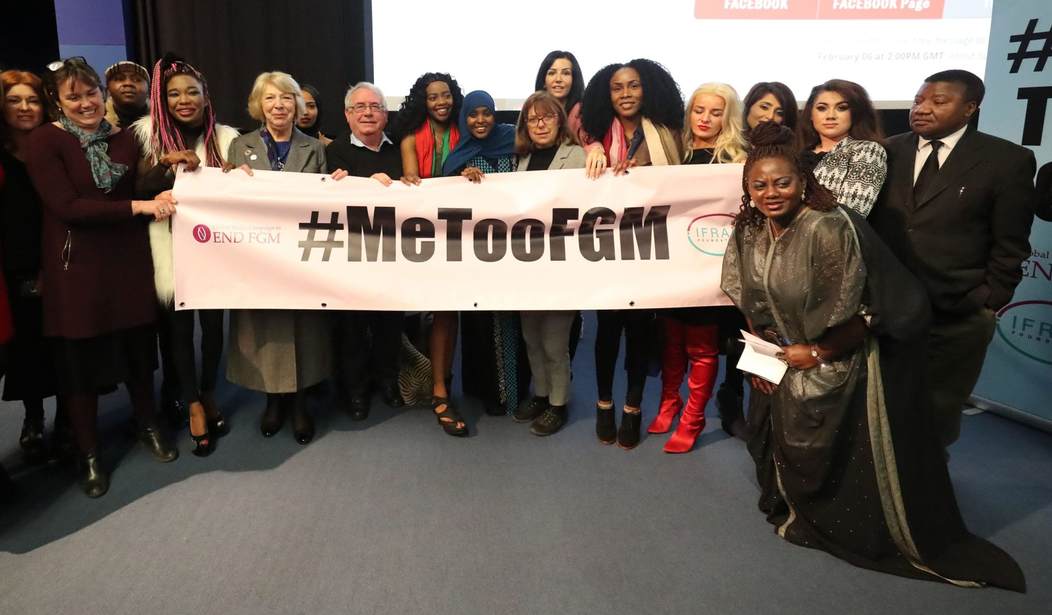In a stunning ruling yesterday, U.S. District Judge Bernard Friedman in Detroit dismissed charges against two doctors and others in a case involving at least nine female genital mutilation (FGM) victims from Minnesota, Illinois, and Michigan — including two seven-year-old girls.
The two doctors and three mothers charged in the case are followers of the Dawoodi Bohra sect of Shia Islam. Their defense attorneys claimed that the FGM procedure was a protected religious rite:
During the case it was revealed that a mosque had paid for the FGM procedures:
A Farmington Hills-based mosque paid a physician to perform female genital mutilation, a lawyer says https://t.co/cBKYhFQXzl
— The Detroit News (@detroitnews) June 14, 2017
At least one of the girls was drugged in order to take her across state lines to have the procedure performed by Dr. Jumana Nagarwala. As many as 100 girls may have been victims in this case:
Feds drop bombshell: Up to 100 girls may have had their genitals cut in Michigan https://t.co/Od5WD1Aw6I
— Detroit Free Press (@freep) June 7, 2017
In his 28-page ruling dismissing most of the charges, Judge Friedman said that Congress had no authority to ban the practice under the Commerce Clause of the U.S. Constitution.
The federal law that the judge struck down banning FGM was passed in 1996, and this was the first attempted federal prosecution in a case of FGM. It was amended in 2013 to stop the transport of victims across state lines. Currently, 27 states ban the procedure.
Friedman ruled:
There is nothing commercial or economic about FGM. As despicable as this practice may be, it is essentially a criminal assault just like the rape at issue in Morrison. Nor has the government shown that FGM itself has any effect on interstate commerce or that a market exists for FGM beyond the mothers of the nine victims alleged in the third superseding indictment. There is, in short, no rational basis to conclude that FGM has any effect, to say nothing of a substantial effect, on interstate commerce. The present case cannot be distinguished from Lopez or Morrison. As in those cases, FGM is a crime that could be prosecuted under state law. FGM is not part of a larger market and it has no demonstrated effect on interstate commerce. The Commerce Clause does not permit Congress to regulate a crime of this nature.
While there have been many critics over the years of the use of the Commerce Clause by Congress to expand federal criminal and regulatory powers, this seems an odd situation for the federal judiciary to finally move against that effort.
What impact this ruling might have on similar federal criminal cases, such as kidnapping, is still unknown.
Several FGM victims have spoken out following yesterday’s ruling:
These are children; little girls; between the ages of 2 to 8; they have no idea and from one moment to the next they are held down by people they love. And then chop! Parts of their genitalia are gone! The law must protect them! PLEASE.
— Ayaan Hirsi Ali (@Ayaan) November 21, 2018
The two doctors in the case still face charges of conspiring to obstruct an official proceeding, and conspiring to travel with intent to engage in illicit sexual conduct. Federal prosecutors are likely to challenge Friedman’s ruling.
CNN reported last year on the dramatic rise in the number of women and girls at risk of FGM since the federal law was passed:
The alarming rise of female genital mutilation in America https://t.co/17tlXhUjZk pic.twitter.com/zufu1Hl7Pg
— CNN Politics (@CNNPolitics) May 11, 2017
Surprisingly, there have been coordinated efforts to stop states from banning FGM. Democrat legislators in Maine successfully scuttled a bill banning FGM earlier this year. Also, a bill banning FGM passed by the Minnesota House last year was stopped in the Senate after complaints from immigrants rights groups and Islamic organizations:
Sen. stuns voters with decision to forgo a vote on a bill that would enhance penalities against FGM crimes #mnleg https://t.co/UDZW7fdWMv
— Alpha News MN (@AlphaNewsMN) May 22, 2017
Opposition from immigrants, refugees slows Minnesota bill against female genital mutilation, raises second thoughts https://t.co/nKyenLUhLP pic.twitter.com/ePMxej5aM0
— Star Tribune (@StarTribune) May 19, 2017
Some states that ban FGM, like Tennessee, have seen no prosecutions despite reported cases:
Tennessee Health Department Says Female Genital Mutilation Is Not Our Problem, Even After 21 Cases Reported in 2011 https://t.co/TNieRoNJgW
— Patrick Poole (@pspoole) April 22, 2017
There appears to be plenty of support for FGM among U.S. Islamic leaders. In 2012, a fatwa issued by a senior member of the Association of Muslim Jurists of America (AMJA) described FGM as “an honor.”
The fact that Hatem al-Haj, aka Hatem Elhagaly, was a licensed pediatrician working at the Mayo Clinic in Minnesota raised concerns. After Dr. Elhagaly’s fatwa was translated and made public, he and the Mayo Clinic parted ways.
More recently, Shaker Elsayed of the Dar Al-Hijrah mosque in Falls Church, Virginia, in the D.C. area, publicly made statements in support of FGM to prevent “hypersexuality”:
Shaker Elsayed, Imam of Dar Al-Hijrah Mosque in Fairfax County, VA, Endorses FGM: It Prevents Girls from Becoming Hypersexually Active pic.twitter.com/DoMtvQHz9G
— MEMRI (@MEMRIReports) June 1, 2017
Imam Elsayed was briefly suspended and then reinstated by Dar Al-Hijrah, following the controversy.
Amazingly, FGM supporters have had the American Academy of Pediatrics on their side since 2010, when a bioethics panel determined they could support “genital cutting” as a compromise with supporters:
Group Backs Ritual ‘Nick’ as Female Circumcision Option http://nyti.ms/9oCKSu
— NYT National News (@NYTNational) May 7, 2010
The Detroit case is U.S. v. Nagarwala, U.S. District Court, Eastern District of Michigan, No. 17-20274.










Join the conversation as a VIP Member